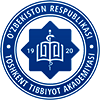The aim of education in clinical ordination is training of high-qualified specialists for working in the institutions of health care system, or in private clinics. The main purposes of residents in clinical ordination are to study methodological, clinical and medical social subjects in medicine, and to form skills of professional self-activity.
Graduators of Tashkent medical academy may continue their medical education in clinical ordination by 42 specialties.
The education in clinical ordination is performed according to education program approved by ministry of Health care of Uzbekistan republic, and it continues 2-3 years. The program includes theoretical and practical aspects.
In clinical ordination, the training is made in clinical and theoretical departments of academy. During education, the resident makes planned work of doctor and practices under his senior colleagues. Applying of practical skills on medical specialties is performed with the help of clinical cycles in various departments.
At the end of each education year, the resident makes the report about performed work and his individual plan, and passes validation as well.
At the end of clinical ordination specialist passes exam and gets certificate about graduation of clinical ordination.
The resident may continue his education in postgraduate (the duration of education 3 years).
The list of medical specialties and qualifications, by which it is performed the training in clinical ordination.
| The names of clinical ordination specialties | The names of qualifications |
| Obstetrics and gynecology | Gynecologist |
| Allergology and immunology | Allergologist, immunologist |
| Anesthesiology and resuscitation | Anesthetist |
| Gastroenterology | Gastroenterologist |
| Hematology | Hematologist |
| Genetics | Geneticist |
| dermatology, venereology | Dermatologist, venereologist |
| Children surgery | Children surgeon |
| Infectious diseases | Infectious disease specialist |
| Cardiology | Cardiologist |
| Cardio- surgery | Cardio surgeon |
| Clinical laboratory diagnostics | Laboratory diagnostics doctor |
| Clinical pharmacology | Pharmacologist |
| Combustiology | Surgeon combustiologist |
| Physiotherapy | Doctor by physiotherapy |
| Radiology | Radiologist |
| Medical professionals social examination | expert doctor |
| Neurology | Neurologist |
| Neurosurgery | Neurosurgeon |
| Nephrology | Nephrologist |
| General practice | General practitioner |
| Oncology | Oncologist |
| Orthodontics | Orthodontist |
| Otolaryngology | Otolaryngologist |
| Ophthalmology | Ophthalmologist |
| Pathologic anatomy | Pathologist |
| Pediatrics | Pediatrician |
| Proctology | Proctologist |
| Occupational pathology | Occupational pathologist |
| Psychiatry- narcology | Psychiatrist-narcologist |
| Psycho-therapy | Psychotherapist |
| Pulmonology | Pulmonologist |
| Rehabilitation medicine | Rehabilitation specialist |
| Rheumatology | Rheumatologist |
| Vascular surgery | Vascular surgeon |
| Спортsport medicine | Doctor by sport medicine |
| Therapy | Therapist |
| Traumatology and orthopedics | Traumotologist, orthopedist |
| Transplantology | Transplantologist |
| Transfusiology | Transfusiologist |
| Urology | Urologist |
| Phthisiology | TB specialist |
| Surgery | Surgeon |
| Endocrinology | Endocrinologist |
| Endoscopy | Endoscopist |
Postgraduate education at TTA
In accordance with the Resolution from the Cabinet of Ministers of the Republic of Uzbekistan “On measures to improve the system of postgraduate education and attestation of scientific and scientific-pedagogical personnel with higher qualification” at the Tashkent Medical Academy dated December 28, 2012, No_365 and 22 may,2017, No_304 implemented: The doctoral students study at TTA in the following areas:
For doctoral studies:
- 14.00.01-Obstetrics and gynecology
- 14.00.07-Hygiene
- 14.00.09-Pediatrics
- 14.00.27- Surgery
There are 5 PhD students in total.
For basic doctorate:
- 14.00.01-Obstetrics and gynecology
- 14.00.02-Morphology
- 14.00.03-Endocrinology
- 14.00.04-Otorhinolaryngology
- 14.00.05-Internal diseases
- 14.00.07- Hygiene
- 14.00.08-Ophthalmology
- 14.00.09- Pediatrics
- 14.00.12-Medical rehabilitation
- 14.00.13-Neurology
- 14.00.15-Pathological anatomy
- 14.00.16-Normal and pathological physiology
- 14.00.17-Pharmacology and clinical pharmacology
- 14.00.18-Psychiatry and narcology
- 14.00.21-Dentistry
- 14.00.22-Traumatology and orthopedics
- 14.00.23- Organization of nursing work
- 14.00.27 Surgery
- 14.00.29-Hematology and transfusiology
- 14.00.30-Epidemiology
21. 14.00.31-Urology22. 14.00.33-Public Health. Health Care Management23. 14.00.36-Allergology and immunology24. 14.00.38-Sports Medicine25. 19.00.04-Medical and special psychology26. 03.00.01-Biochemistry Total 50 PhD students
In 2019, one major doctoral student defended his doctoral degree in psychiatry and narcology in 114.00.19.
The Academy has 143 independent researchers. Of these, 121 PhD and 22 DSc are independent researchers. In 2019, 16 independent researchers defended their dissertations.
Dissertation topics for doctoral students and independent researchers are identified by the Center for Science and Technology and correspond to the priority areas of medicine in which the scientists of the Institute participate.
The departments of the institute have sufficient scientific and practical base for preparation of scientific and pedagogical staff. They are fully provided with necessary equipment, chemical reagents, experimental animals, vivarium and information technology. There is a central scientific laboratory equipped with modern equipment for medical staff, there is “Central Asian Journal of Medicine” medical journal and a training center and English language clubs for posting scientific articles on research. The Academy works with doctoral students and supporting doctoral students in accordance with the guidelines and instructions of the Ministry in this area.



